The Hill’s Morning Report – Attacked repeatedly, Biden fires back

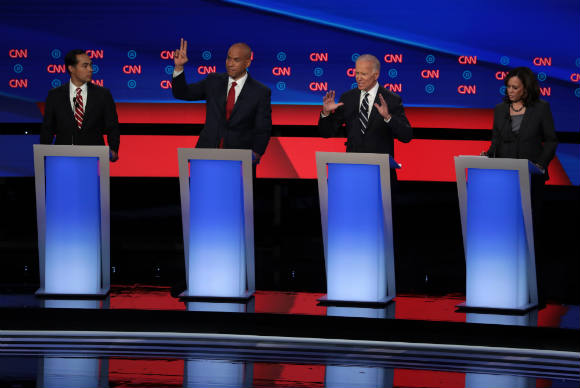
Welcome to The Hill’s Morning Report. Happy Thursday and it’s August already! Our newsletter gets you up to speed on the most important developments in politics and policy, plus trends to watch. Co-creators are Alexis Simendinger and Al Weaver (CLICK HERE to subscribe!). On Twitter, find us at @asimendinger and @alweaver22.
Former Vice President Joe Biden came under fire from fellow White House contenders during Wednesday night’s debate, pummeled for defending Obama-era policies including the Affordable Care Act, deportations of immigrants during that administration, and his pitch to rejoin the Paris climate accord signed in 2016 and rejected by President Trump.
Sens. Kamala Harris (D-Calif.) and Cory Booker (D-N.J.), joined by New York City Mayor Bill de Blasio and former Housing and Urban Development Secretary Julián Castro, took aim at Biden’s record as vice president and as a senator from Delaware.
“Everyone is talking about how terrible I was on these issues,” Biden responded at one point, underscoring the extensive vetting he underwent before he joined former Sen. Barack Obama’s ticket in 2008. “He chose me and said it was the best decision he made.”
Biden was better prepared and more combative during the debate in Detroit than he had been during the first debate in Miami, when he was caught off-guard by Harris’s criticisms about his 1970s record on race and school desegregation, and his past opposition to school busing.
The former vice president sparred with Harris on Wednesday about her “Medicare for All” plan, arguing it would be too expensive and unnecessary to push Americans away from private health coverage. She responded that Biden’s approach to revive ObamaCare with improvements would leave millions of Americans without coverage.
“For a Democrat to run for president with a plan that doesn’t cover everyone is without excuse,” she said.
Booker and Castro leaped at openings to make a generational case against Biden, referring to his record, his ideas and his centrist approach to politics as retro and obsolete.
Booker, who minutes before urged Democrats to holster their fire for one another to remain united, took aim at the former vice president’s Senate support for the 1994 crime bill. “You’re dipping at the Kool-Aid and you don’t even know the flavor,” Booker said, using street slang to audience applause. “This isn’t about the past sir, it’s about the present.”
“It sounds like one of us has learned the lessons of the past, and one of us hasn’t,” Castro said during a sharp back-and-forth with Biden about immigration.
Biden, leaning on his oft-used dismissal — “malarkey” — defended his record, sometimes with tangled sentences to return fire, arguing that Booker, as the former mayor of Newark, N.J., for eight years, had “done nothing” about the city’s controversial policing.
Despite the slings and arrows at Biden, some of his supporters said they were pleased with the performance, especially after his wobbly showing in June, which alarmed some Democrats who backed him as a front-runner.
“I’m very happy with Biden’s performance,” said one close Biden supporter, who asked for anonymity. “I’m really surprised by the attacks by a number of them on the Obama record Is attacking Obama’s record really a winner in a Dem primary race??!! Hard for me to see that.”
Among the winners in Wednesday’s debate is Booker, who turned in a strong performance to boost his presence after struggling to impact the race for months. Niall Stanage writes that while Booker didn’t have a single moment in the debate, he was consistently strong and asserted himself as a major player.
On the losing end was Harris, who sought to follow up on her impressive performance in Miami. Her status in the Democrats’ top tier put a target on her back, and not just from Biden. Multiple candidates opened the opposition research book against her. She came under siege during one particularly scathing attack by Rep. Tulsi Gabbard (D-Hawaii) over her record on criminal justice and capital punishment as California attorney general.
Gabbard accused the California Democrat of locking up scores of racial minorities on low-level drug offenses, of hiding evidence that would free an innocent man on death row, and said she kept people imprisoned for longer sentences to use them as cheap prison labor, leaving Harris looking rattled for the first time in the debate season. Harris told Gabbard that she was overseeing criminal justice in the state, adding the House lawmaker weighed in absent experience as a prosecutor.
The back-and-forth came after Biden attacked Harris over her tenure as state attorney general, specifically that California had two districts that were more segregated than any in the country, adding that she turned a blind eye to rogue police departments.
Elsewhere, Sen. Kirsten Gillibrand (D-N.Y.) struggled once again as she continues to have trouble putting her stamp on the primary race. She was on the losing end of a back-and-forth with Biden after she accused him of opposing women working outside the home, with the former vice president noting his work to pass the Violence Against Women Act and the Lilly Ledbetter Fair Pay Act.
“I don’t know what happened, except you’re now running for president,” Biden retorted.
From the two debates, Sen. Elizabeth Warren (D-Mass.) and Sen. Bernie Sanders (I-Vt.) emerged as winners. Both stood their ground in the face of attacks from centrists and their performances gained altitude with supporters. Wednesday night’s event, on the other hand, unveiled more mixed reviews about the candidates on stage.
Biden and Harris dominated the speaking time on Wednesday night, with Biden speaking for 21 minutes and Harris for more than 17 minutes. No other candidate eclipsed 13 minutes.
The Hill: Senate Democrats see proposals from Warren, Sanders as unfeasible.
The Hill: Winners and losers from two nights of debates in Detroit.
The Hill: Ugly divisions on display as Democrats turn on each other.
The Hill: Top moments during Detroit debate on Wednesday.
The Hill: Five takeaways on second debate night in Detroit.
The Hill: Booker to Biden on Obama: “You can’t have it both ways.”
Wednesday’s debate also included Sen. Michael Bennet (D-Colo.), who joined Biden in criticizing Harris’s approach to health care reform and spoke powerfully about education. Entrepreneur Andrew Yang drew laughter for contrasting himself with Trump as “the Asian man who likes math.” Washington Gov. Jay Inslee capitalized on opportunities to describe the urgency of tackling climate change.
The Hill: Harris faced attacks from Biden, Bennet and Gabbard on health plan.
The Democratic National Committee is skipping August and the next debate takes place September 12 and September 13 in Houston at Texas Southern University, a public historically black university and will be hosted by ABC News and Univision. The DNC raised the threshold for candidates to qualify to participate, meaning the number of debaters on stage in a few weeks could shrink, setting up a six-week sprint for candidates to hit the needed benchmarks.
To date, seven candidates — Biden, Harris, Sen. Elizabeth Warren (D-Mass.), Sen. Bernie Sanders (I-Vt.), South Bend, Ind., Mayor Pete Buttigieg, Booker and former Rep. Beto O’Rourke (D-Texas) — have qualified. Sen. Amy Klobuchar (D-Minn.) has qualified in polling, while Yang and Castro have both reached the donor threshold. This begs the question — which candidate will throw in the towel before Labor Day?
As for Trump, he’ll rally supporters tonight in Cincinnati in an attempt to rebut the 2020 field of challengers. Start time is 7 p.m.
Perspectives & Analysis:
Dan Balz: Wednesday’s presidential debate turns on character as much as ideology, a foreboding turn for Democrats.
The New York Times: Joe Biden did fine, and that might have been enough.
Gail Collins: Debate drama: Here’s Joe.
Gerald F. Seib: Debates leave trio of presidential battles.
Jonathan Bernstein: Democrats in Detroit debates know what they’re talking about.
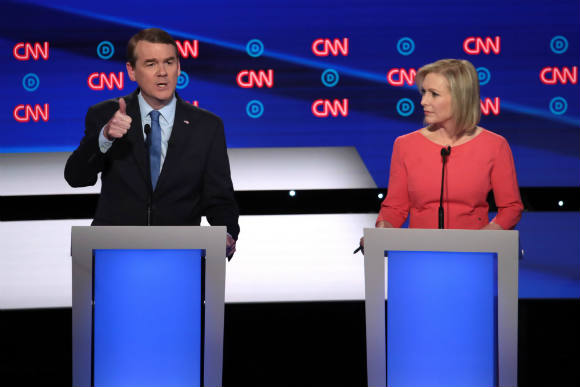
LEADING THE DAY
CONGRESS: The Senate is expected to vote today on the bipartisan deal to raise the spending caps and the debt ceiling despite some questions about Republican support for the bill as the chamber readies for the five-week August recess.
While the bill is still expected to pass today, it remains unknown if a majority of the Senate Republican Conference will support it. Only 65 House Republicans backed the budget bill last week (The Hill).
Sen. John Thune (S.D.), the No. 2 Senate Republican, warned that “failure is not an option.”
“We’ll find out tomorrow. But we’ve been working it, as you know, and the Democrats and the Republicans are both going to have to deliver votes for this, but I would say failure is not an option,” Thune said.
“You’ve got a lot of members who are very eager to vote for it,” he continued. “But you know all these votes, any spending vote or debt limit vote is never easy. … We’ve got members who obviously are probably not going to vote for it.”
Just like in the House, some Senate Republicans are concerned with the $320 billion the deal adds to the deficit over the next two years. Others, however, support the package for the $740 billion included in the package for the Pentagon.
The vote is expected to take place around noon, with the Senate leaving town immediately after for recess (The Hill).
The Hill: Senate confirms 13 Trump judges ahead of August recess.
> Asylum: A push by Senate Judiciary Committee Chairman Lindsey Graham (R-S.C.) is roiling the Senate as he threatens to ram through legislation to reform asylum laws by waiving committee rules and forcing a vote today.
The South Carolina Republican’s legislation would deal with family separations at the border, an issue that has plagued the Trump administration, by increasing the number of days a family can be held together from 20 days to 100 days. While it would prevent the separations, it would lengthen the time children can be held in custody with their parents.
As Jordain Carney reports, the bill would also require asylum claims be filed in Mexico or a home country rather than in the U.S., provide funding for 500 new immigration judges and allow unaccompanied minors from Central America to be sent back to their home countries, similar to unaccompanied minors from Canada and Mexico.
Democrats are accusing Graham of pushing through the legislation by foregoing panel rules that require at least two members from the minority party to be present in order to consider the bill immediately. They believe Graham and the GOP are nixing the rules to benefit them politically.
“It’s a dramatic departure from the way the committee has been managed in the past. It has been a very bipartisan committee with few exceptions and to force through a controversial measure on immigration in this manner doesn’t help us on the agenda we face,” said Sen. Dick Durbin (Ill.), the No. 2 Senate Democrat.
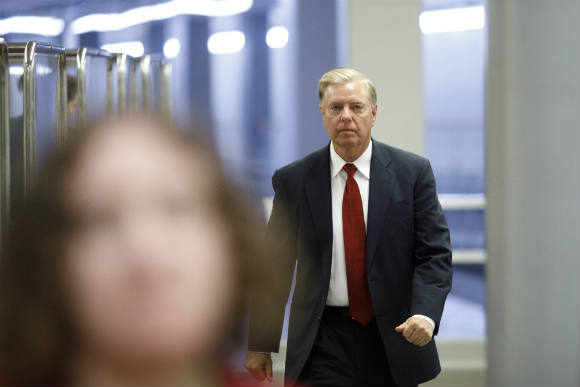
IN FOCUS/SHARP TAKES
WHITE HOUSE & ADMINISTRATION: The Treasury Department on Wednesday imposed sanctions on Iranian Foreign Minister Mohammad Javad Zarif in an escalation of tensions between the United States and Iran.
Zarif was a central player during negotiations with the Obama administration to craft a nuclear deal with Tehran in 2015 that lifted crippling economic sanctions in exchange for verifiable nuclear restrictions. It was backed by the United States, the United Kingdom, France, China, and Russia, the five permanent members of the United Nations Security Council, plus Germany.
A Treasury Department statement said Zarif was sanctioned because he “acted or purported to act for or on behalf of, directly or indirectly” Iran’s supreme leader, Ali Khamenei, who was sanctioned by the United States in late June. At that time, Treasury Secretary Steven Mnuchin said measures would also be taken against Zarif, although action was subsequently postponed amid statements by Trump that he was willing to negotiate with Iran “without preconditions” (The Washington Post).
Council on Foreign Relations: What is the status of the Iran nuclear agreement?
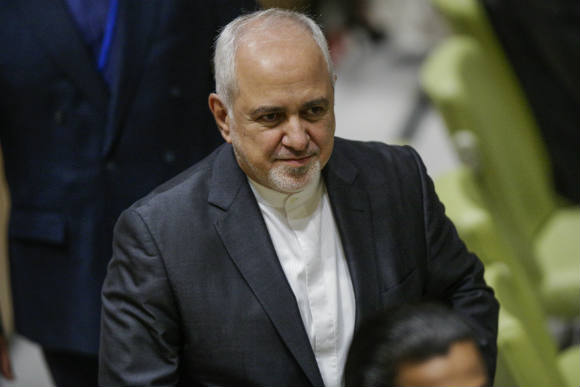
Separately, Germany said on Wednesday it will not join a U.S.-proposed mission to secure the Strait of Hormuz in the Middle East from what the Trump administration called Iranian aggression. The United States had asked Germany to join France and Britain in a mission to secure shipping through the strait, through which about a fifth of the world’s oil passes (Reuters).
> Health and Human Services: The administration unveiled a plan on Wednesday to allow imports of cheaper prescription drugs from Canada, an option the department previously called “a gimmick,” but which supports the president’s desire to show some form of progress toward reducing the costs of prescription drugs. Officials did not specify a timeline when the plan would go into effect (The Hill). Pharmaceutical companies are opposed (Reuters).
> Trade: The White House described trade talks that concluded on Wednesday with China as “constructive,” although a working dinner and half a day of discussions in Shanghai produced no breakthroughs (The Hill). China’s foreign ministry on Wednesday blamed the United States for flip-flopping over the past year, following recent Trump comments that warned Beijing against stalling (Reuters).
The Morning Report is created by journalists Alexis Simendinger and Al Weaver. We want to hear from you! Email: asimendinger@digital-stage.thehill.com and aweaver@digital-stage.thehill.com. We invite you to share The Hill’s reporting and newsletters, and encourage others to SUBSCRIBE!
OPINION
Five reasons Democrats should be the party of free trade, by Kimberly A. Clausing, opinion contributor, The Hill. https://bit.ly/2YhYRe0
First immigrants, then you: Policing methods are used on immigrants, then others, by Alan Hyde, opinion contributor, The Hill. https://bit.ly/2GEH1Y9
WHERE AND WHEN
Hill.TV’s “Rising” at 9 a.m. ET features Rep. Rick Crawford (R-Ark.) to talk about Rep. John Ratcliffe’s (R-Texas) nomination as director of national intelligence; South Carolina state Rep. J.A. Moore (D), a supporter of Harris, comments on Wednesday’s presidential debate; Seth Cohen, founder of Humanity FWD, speaks about the acceptance by Andrew Yang’s super PAC of Bitcoin donations; and miner Collin Cornette describes protests by coal miners in Harlan County, Ky. Find Hill.TV programming at http://digital-stage.thehill.com/hilltv or on YouTube at 10 a.m.
The House is in recess through August and will return to Washington on Sept. 9.
The Senate convenes at 9:30 a.m. with the House-passed budget deal on the floor.
The president will have lunch with Secretary of Defense Mark Esper. Trump travels to Cincinnati, this evening for a reelection rally and fundraising reception with donors.
Vice President Pence heads today to Shady Grove, Pa., to speak at 2:30 p.m. to employees of Manitowoc Cranes Co. as a backdrop to urge congressional ratification of the United States-Mexico-Canada trade agreement. Later, Pence travels to Cincinnati to introduce Trump at 7 p.m. at a reelection rally at U.S. Bank Arena.
Secretary of State Mike Pompeo is traveling through Aug. 6 to Bangkok (ASEAN ministerial meetings); Sydney (Australia-United States Ministerial Consultations); and Kolonia, Micronesia, the first visit to the Pacific island nation by a sitting secretary of State.
ELSEWHERE
➔ Federal Reserve: The nation’s central bank announced Wednesday it plans to cut its baseline interest rate range by a quarter-point, easing the federal funds rate for the first time since the 2008 financial crisis in a bid to shield the U.S. economy from a global downturn. The move was widely expected (The Hill).
Although Trump for months castigated Chairman Jerome Powell and advocated a rate cut, the president tweeted his continued displeasure that Powell and Fed governors did not signal additional “aggressive” easing this year. The chairman, during a news conference on Wednesday, said the July easing should not be seen as the first of a series in 2019 (The Hill).
“What the Market wanted to hear from Jay Powell and the Federal Reserve was that this was the beginning of a lengthy and aggressive rate-cutting cycle which would keep pace with China, The European Union and other countries around the world,” Trump tweeted. “As usual, Powell let us down, but at least he is ending quantitative tightening, which shouldn’t have started in the first place — no inflation. We are winning anyway, but I am certainly not getting much help from the Federal Reserve!”
➔ Higher education: To cheat and lie in L.A.: How the college admissions scandal ensnared the richest families in Southern California (Vanity Fair).
➔ In the Know: Former President George W. Bush surprised many, including family members, after he turned to painting during his post-White House retirement in Dallas. His 2017 series depicting U.S. soldiers who served in the military after 9/11 is titled “Portraits of Courage” and will be exhibited at the Kennedy Center’s new REACH facility from Oct. 7 through Nov. 15 (The Hill). The 66 portraits were shown in 2017 at the George W. Bush Presidential Center in Texas and published in a book, part of a larger initiative to support 9/11 veterans and their families. The former president’s exhibit has been on tour since 2018.
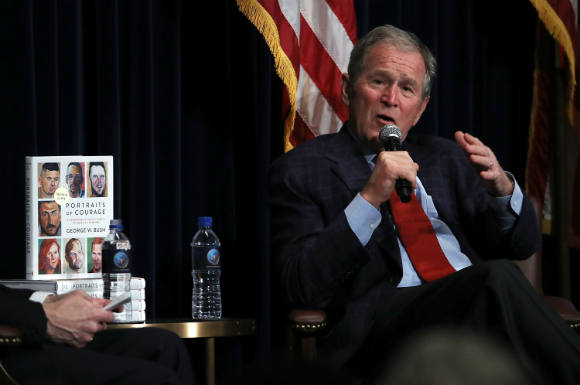
THE CLOSER
And finally … It’s Thursday, which means it’s time for this week’s Morning Report Quiz! Inspired by August in Washington, we’re eager for some smart guesses about Congress’s summer vacation.
Email your responses to asimendinger@digital-stage.thehill.com and/or aweaver@digital-stage.thehill.com, and please add “Quiz” to subject lines. Winners who submit correct answers will enjoy some richly deserved newsletter fame on Friday.
Congress’s August recess got its official, statutory start with the Legislative Reorganization Act. In what year was it enacted?
- 1950
- 1960
- 1970
- 1980
Washington’s swampy summers encouraged early lawmakers to clamor for long August breaks. To improve working conditions in the Capitol, “manufactured weather” was installed by the Carrier Corporation. In what year did the Senate chamber get its first air conditioning system?
- 1929
- 1942
- 1962
- 1985
Which former vice president famously observed that “no good legislation ever comes out of Washington after June.” Hint: He was once a House Speaker.
- Adlai Stevenson I
- John Nance Garner
- Spiro Agnew
- Dick Cheney
The House and Senate limit the number of days either can be in recess without the approval of the other chamber. What’s the limit?
- Three days
- 10 days
- 30 days
- Six months
Last summer, Senate Majority Leader Mitch McConnell (R-Ky.) announced he would cancel all but a week of the August recess so that senators could get more work done in Washington. What factor contributed to his decision?
- Overwhelming number of senators argued to spend August in D.C.
- GOP political strategy to limit campaigning by vulnerable Senate Democrats before midterm elections in November
- National emergency
- Senate followed the House, which shortened its August recess in 2018

Copyright 2023 Nexstar Media Inc. All rights reserved. This material may not be published, broadcast, rewritten, or redistributed. Regular the hill posts








